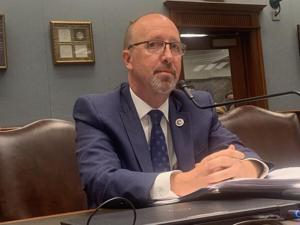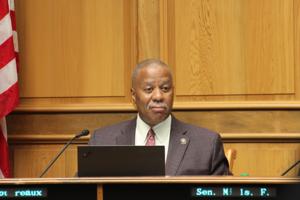
State legislators’ salaries will remain unchanged after a House committee on Monday killed a proposal to raise legislative pay for the first time in 43 years.
Several lawmakers who rejected the measure said they are underpaid but that they couldn’t agree to the increase, especially in an election year.
“That’s the reason the salary hasn’t been raised since 1980 – people are afraid to vote for something the public perceives as a pay raise benefiting their own pocketbooks,” Rep. Joe Marino, an independent from Gretna who sponsored the proposed pay raise, said in an interview afterward.
With the defeat of his House Bill 149, base pay for legislators will remain $16,800 per year.
The Legislature approved a pay hike in 2008, but then-Gov. Bobby Jindal, who had said he would support it, reversed himself and vetoed the measure after a public outcry.
Marino began the legislative session by seeking to raise salaries to $60,000, which he said amounted to slightly less than the $16,800 adjusted for inflation since 1980.
He won approval for HB 149 from the House and Governmental Affairs Committee last week but only after agreeing to limit the pay raise to 75% of the median household income, or about $40,000.
The House Appropriations Committee had to decide on Monday whether to advance that pay raise to the full House.
Marino pointed out that legislators have increased the salary for the governor from $52,400 in 1980 to $130,000 today, statewide elected officials from $37,500 to $115,000 today and sheriffs from $44,400 to almost $195,000.
“Everybody else’s salary we can control has gone up,” he said.
Marino argued that keeping a lid on legislative pay means that only legislators who are either wealthy, retired or self-employed can afford to hold the office.
Rep. Darryl Deshotel, R-Hessmer, agreed with him.
“This salary prohibits a true representation of all the people in our state,” said Deshotel, who is financially independent and donates his salary to charity. “The optics overshadow what is smart and what we should be doing.”
Rep. John Illg, R-Metairie, said he tried recently to recruit four people to run for the House and received a positive reaction until he told them how much they’d earn for what’s called a part-time job.
The job actually isn’t part-time, said Illg, noting that he has put 100,000 miles on his vehicle since buying it in 2019. (The Legislature reimburses for mileage on one round-trip per week, although many lawmakers drive home every day.)
“It’s not like we clock out when we sine die and it’s over,” Illg said, referring to the end of the regular legislative session, which lasts 60-80 days per year, not including special sessions.
To do their job well, Illg added, lawmakers have “to show up at every civic meeting, any social event in their district.”
Rep. Jason Hughes, D-New Orleans, agreed with Marino that lawmakers deserve more pay and said constituents who attended a town hall meeting of his in March were shocked at how little he earns.
Besides the $16,800, legislators also receive per diem of $161 for when they are in session, although that figure covers their living and food costs, along with $6,000 that is supposed to cover their additional expenses. In all, a typical legislator receives about $30,000 per year.
But Hughes said he opposed Marino’s bill because he believes that an independent commission ought to set the pay. He added that teachers, law enforcement officials and state employees deserve a pay raise.
“The legislative pay raise is always a tricky issue,” Hughes said.
He noted that then-state Rep. Terry Landry, D-New Iberia, proposed in 2019 to ask voters to create such a commission, but lawmakers didn’t advance his plan.
Rep. Tony Bacala, R-Prairieville, also said he believes lawmakers are paid too little. But he said that’s the price they must accept for the job.
Rep. Debbie Villio, R-Kenner, seconded Bacala, saying that, while she loses money by working as a legislator, “ I ran for the reasons of service, and I’m committed to that.”
As the hearing on the bill was ending, more legislators had spoken against the bill than in favor. Rep. Jerome Zeringue, R-Houma and the committee chairman, sealed its fate by taking the unusual step of telling his colleagues before the vote that he would oppose HB 149.
The committee rejected it, 16-5.
Voting for HB 149: Reps. Deshotel; Mary DuBuisson, R-Slidell; Aimee Adatto Freeman, D-New Orleans; Illg; and Rodney Lyons, D-Marrero.
Voting against HB 149: Reps. Roy Daryl Adams, D-Jackson; Bacala; Barbara Carpenter, D-Baton Rouge; Dewith Carrier, R-Oakdale; Raymond Crews, R-Bossier City; Brett Geymann, R-Lake Charles; Hughes; Tim Kerner, R-Jean Lafitte; Jack McFarland, R-Jonesboro; Dustin Miller, D-Lawtell; Troy Romero, R-Jennings; Francis Thompson, R-Delhi; Chris Turner, R-Ruston; Villio; Bill Wheat, R-Ponchatoula.



Leave a Reply